Global Business: The Politics of Oil and Its Implications (MGMT8110)
VerifiedAdded on 2022/10/17
|8
|3009
|386
Essay
AI Summary
This essay examines the significant influence of oil politics on global business operations, analyzing the effects of political tensions, trade barriers, and the actions of organizations such as OPEC. The essay explores historical conflicts, the involvement of major nations like the United States, and the impact of sanctions on oil-producing countries. It delves into the implications of oil exploration, the role of oil in international relations, and the impact of fluctuating oil prices on businesses. The essay highlights the challenges faced by companies due to political pressures, trade wars, and the search for alternative energy sources. It further discusses the fragmentation of the global market due to oil politics, the impact on supply chains, and the importance of energy in the geopolitical matrix. The analysis covers the dynamics in regions like the South China Sea and the Middle East, emphasizing the need for free energy flow and the increasing conflicts over oil resources. The essay concludes by discussing the future of oil politics and its influence on international relations, particularly concerning environmental concerns and sustainability, and the role of US in the global oil market.
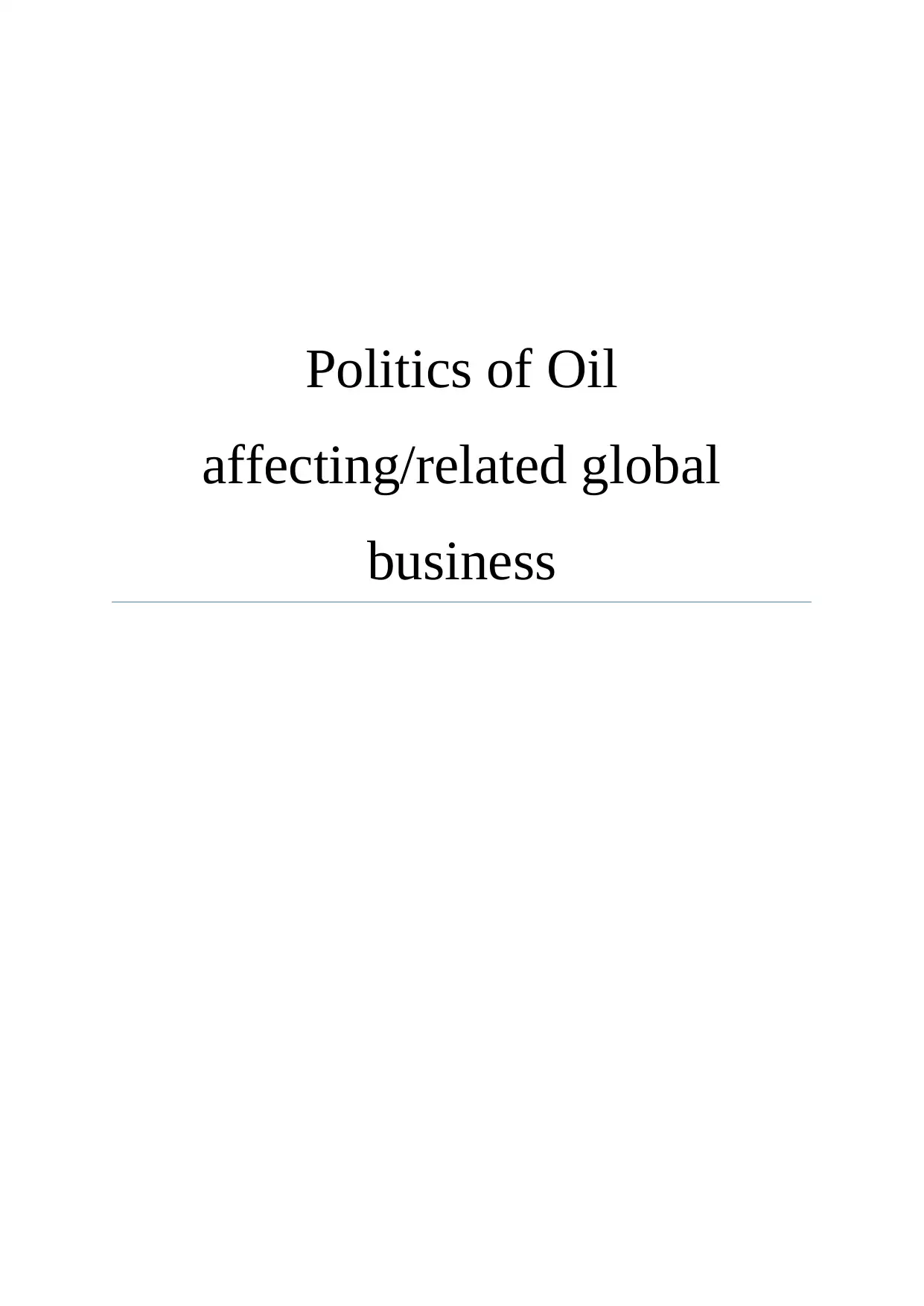
Politics of Oil
affecting/related global
business
affecting/related global
business
Paraphrase This Document
Need a fresh take? Get an instant paraphrase of this document with our AI Paraphraser
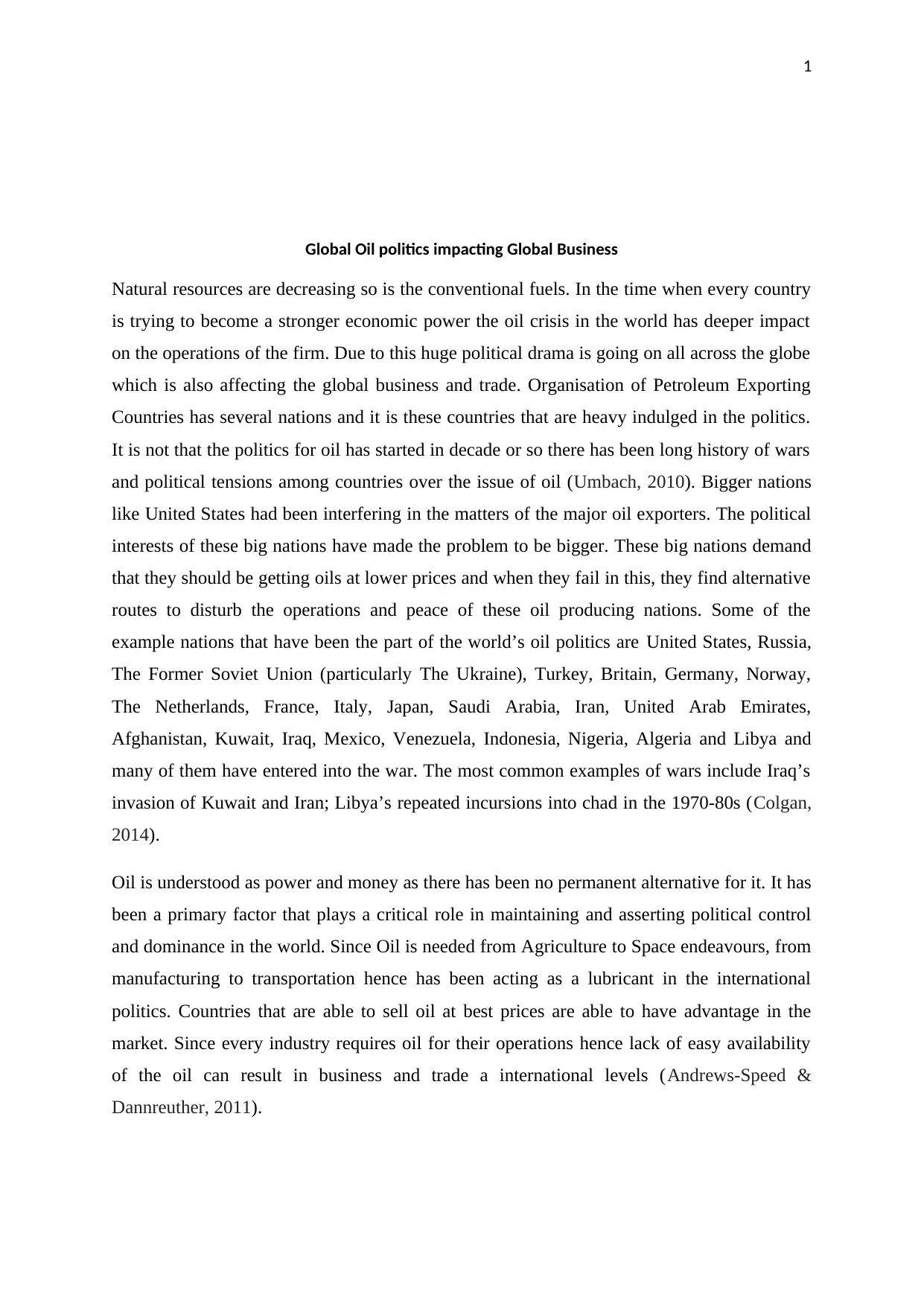
1
Global Oil politics impacting Global Business
Natural resources are decreasing so is the conventional fuels. In the time when every country
is trying to become a stronger economic power the oil crisis in the world has deeper impact
on the operations of the firm. Due to this huge political drama is going on all across the globe
which is also affecting the global business and trade. Organisation of Petroleum Exporting
Countries has several nations and it is these countries that are heavy indulged in the politics.
It is not that the politics for oil has started in decade or so there has been long history of wars
and political tensions among countries over the issue of oil (Umbach, 2010). Bigger nations
like United States had been interfering in the matters of the major oil exporters. The political
interests of these big nations have made the problem to be bigger. These big nations demand
that they should be getting oils at lower prices and when they fail in this, they find alternative
routes to disturb the operations and peace of these oil producing nations. Some of the
example nations that have been the part of the world’s oil politics are United States, Russia,
The Former Soviet Union (particularly The Ukraine), Turkey, Britain, Germany, Norway,
The Netherlands, France, Italy, Japan, Saudi Arabia, Iran, United Arab Emirates,
Afghanistan, Kuwait, Iraq, Mexico, Venezuela, Indonesia, Nigeria, Algeria and Libya and
many of them have entered into the war. The most common examples of wars include Iraq’s
invasion of Kuwait and Iran; Libya’s repeated incursions into chad in the 1970-80s (Colgan,
2014).
Oil is understood as power and money as there has been no permanent alternative for it. It has
been a primary factor that plays a critical role in maintaining and asserting political control
and dominance in the world. Since Oil is needed from Agriculture to Space endeavours, from
manufacturing to transportation hence has been acting as a lubricant in the international
politics. Countries that are able to sell oil at best prices are able to have advantage in the
market. Since every industry requires oil for their operations hence lack of easy availability
of the oil can result in business and trade a international levels (Andrews-Speed &
Dannreuther, 2011).
Global Oil politics impacting Global Business
Natural resources are decreasing so is the conventional fuels. In the time when every country
is trying to become a stronger economic power the oil crisis in the world has deeper impact
on the operations of the firm. Due to this huge political drama is going on all across the globe
which is also affecting the global business and trade. Organisation of Petroleum Exporting
Countries has several nations and it is these countries that are heavy indulged in the politics.
It is not that the politics for oil has started in decade or so there has been long history of wars
and political tensions among countries over the issue of oil (Umbach, 2010). Bigger nations
like United States had been interfering in the matters of the major oil exporters. The political
interests of these big nations have made the problem to be bigger. These big nations demand
that they should be getting oils at lower prices and when they fail in this, they find alternative
routes to disturb the operations and peace of these oil producing nations. Some of the
example nations that have been the part of the world’s oil politics are United States, Russia,
The Former Soviet Union (particularly The Ukraine), Turkey, Britain, Germany, Norway,
The Netherlands, France, Italy, Japan, Saudi Arabia, Iran, United Arab Emirates,
Afghanistan, Kuwait, Iraq, Mexico, Venezuela, Indonesia, Nigeria, Algeria and Libya and
many of them have entered into the war. The most common examples of wars include Iraq’s
invasion of Kuwait and Iran; Libya’s repeated incursions into chad in the 1970-80s (Colgan,
2014).
Oil is understood as power and money as there has been no permanent alternative for it. It has
been a primary factor that plays a critical role in maintaining and asserting political control
and dominance in the world. Since Oil is needed from Agriculture to Space endeavours, from
manufacturing to transportation hence has been acting as a lubricant in the international
politics. Countries that are able to sell oil at best prices are able to have advantage in the
market. Since every industry requires oil for their operations hence lack of easy availability
of the oil can result in business and trade a international levels (Andrews-Speed &
Dannreuther, 2011).
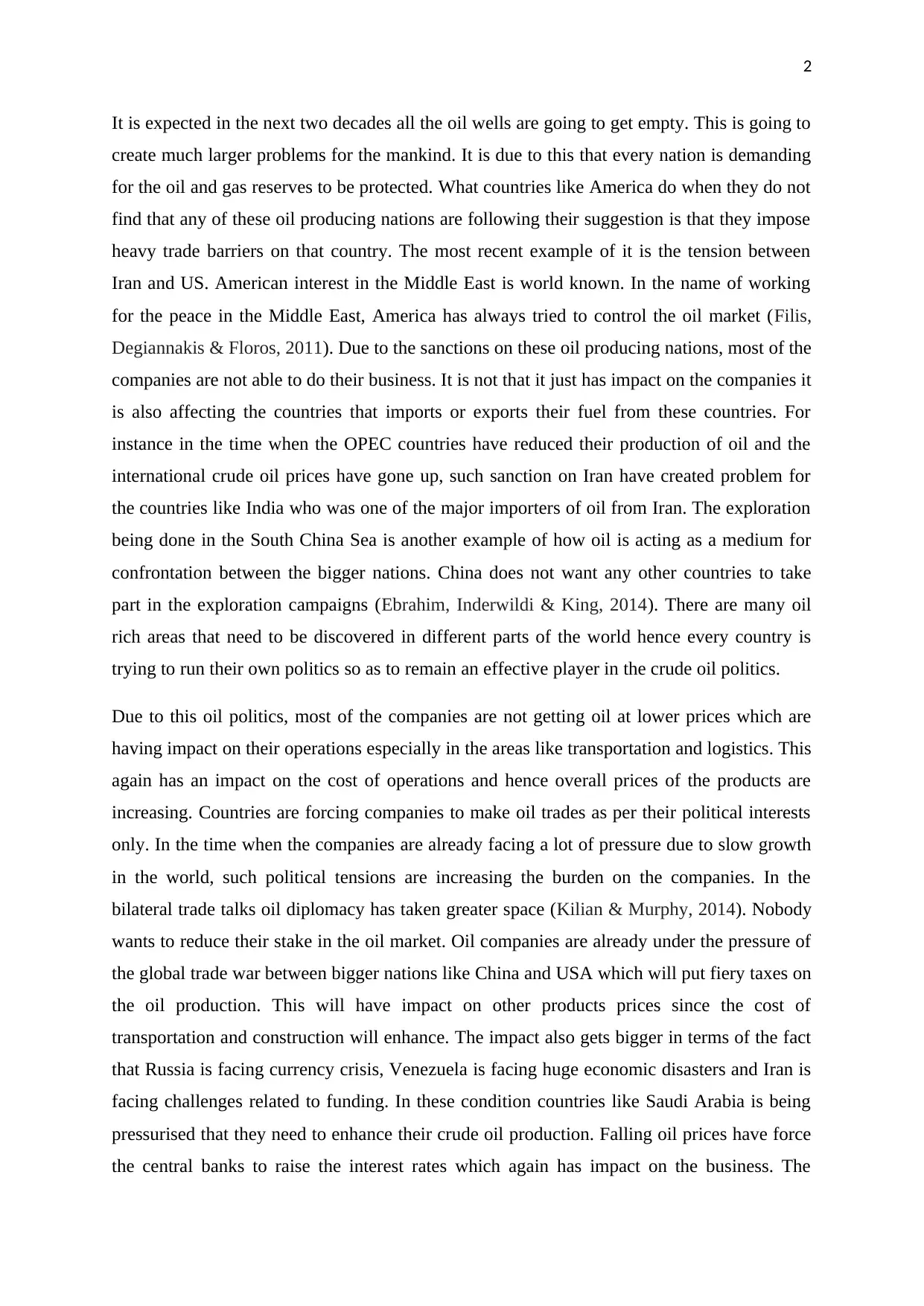
2
It is expected in the next two decades all the oil wells are going to get empty. This is going to
create much larger problems for the mankind. It is due to this that every nation is demanding
for the oil and gas reserves to be protected. What countries like America do when they do not
find that any of these oil producing nations are following their suggestion is that they impose
heavy trade barriers on that country. The most recent example of it is the tension between
Iran and US. American interest in the Middle East is world known. In the name of working
for the peace in the Middle East, America has always tried to control the oil market (Filis,
Degiannakis & Floros, 2011). Due to the sanctions on these oil producing nations, most of the
companies are not able to do their business. It is not that it just has impact on the companies it
is also affecting the countries that imports or exports their fuel from these countries. For
instance in the time when the OPEC countries have reduced their production of oil and the
international crude oil prices have gone up, such sanction on Iran have created problem for
the countries like India who was one of the major importers of oil from Iran. The exploration
being done in the South China Sea is another example of how oil is acting as a medium for
confrontation between the bigger nations. China does not want any other countries to take
part in the exploration campaigns (Ebrahim, Inderwildi & King, 2014). There are many oil
rich areas that need to be discovered in different parts of the world hence every country is
trying to run their own politics so as to remain an effective player in the crude oil politics.
Due to this oil politics, most of the companies are not getting oil at lower prices which are
having impact on their operations especially in the areas like transportation and logistics. This
again has an impact on the cost of operations and hence overall prices of the products are
increasing. Countries are forcing companies to make oil trades as per their political interests
only. In the time when the companies are already facing a lot of pressure due to slow growth
in the world, such political tensions are increasing the burden on the companies. In the
bilateral trade talks oil diplomacy has taken greater space (Kilian & Murphy, 2014). Nobody
wants to reduce their stake in the oil market. Oil companies are already under the pressure of
the global trade war between bigger nations like China and USA which will put fiery taxes on
the oil production. This will have impact on other products prices since the cost of
transportation and construction will enhance. The impact also gets bigger in terms of the fact
that Russia is facing currency crisis, Venezuela is facing huge economic disasters and Iran is
facing challenges related to funding. In these condition countries like Saudi Arabia is being
pressurised that they need to enhance their crude oil production. Falling oil prices have force
the central banks to raise the interest rates which again has impact on the business. The
It is expected in the next two decades all the oil wells are going to get empty. This is going to
create much larger problems for the mankind. It is due to this that every nation is demanding
for the oil and gas reserves to be protected. What countries like America do when they do not
find that any of these oil producing nations are following their suggestion is that they impose
heavy trade barriers on that country. The most recent example of it is the tension between
Iran and US. American interest in the Middle East is world known. In the name of working
for the peace in the Middle East, America has always tried to control the oil market (Filis,
Degiannakis & Floros, 2011). Due to the sanctions on these oil producing nations, most of the
companies are not able to do their business. It is not that it just has impact on the companies it
is also affecting the countries that imports or exports their fuel from these countries. For
instance in the time when the OPEC countries have reduced their production of oil and the
international crude oil prices have gone up, such sanction on Iran have created problem for
the countries like India who was one of the major importers of oil from Iran. The exploration
being done in the South China Sea is another example of how oil is acting as a medium for
confrontation between the bigger nations. China does not want any other countries to take
part in the exploration campaigns (Ebrahim, Inderwildi & King, 2014). There are many oil
rich areas that need to be discovered in different parts of the world hence every country is
trying to run their own politics so as to remain an effective player in the crude oil politics.
Due to this oil politics, most of the companies are not getting oil at lower prices which are
having impact on their operations especially in the areas like transportation and logistics. This
again has an impact on the cost of operations and hence overall prices of the products are
increasing. Countries are forcing companies to make oil trades as per their political interests
only. In the time when the companies are already facing a lot of pressure due to slow growth
in the world, such political tensions are increasing the burden on the companies. In the
bilateral trade talks oil diplomacy has taken greater space (Kilian & Murphy, 2014). Nobody
wants to reduce their stake in the oil market. Oil companies are already under the pressure of
the global trade war between bigger nations like China and USA which will put fiery taxes on
the oil production. This will have impact on other products prices since the cost of
transportation and construction will enhance. The impact also gets bigger in terms of the fact
that Russia is facing currency crisis, Venezuela is facing huge economic disasters and Iran is
facing challenges related to funding. In these condition countries like Saudi Arabia is being
pressurised that they need to enhance their crude oil production. Falling oil prices have force
the central banks to raise the interest rates which again has impact on the business. The
⊘ This is a preview!⊘
Do you want full access?
Subscribe today to unlock all pages.

Trusted by 1+ million students worldwide
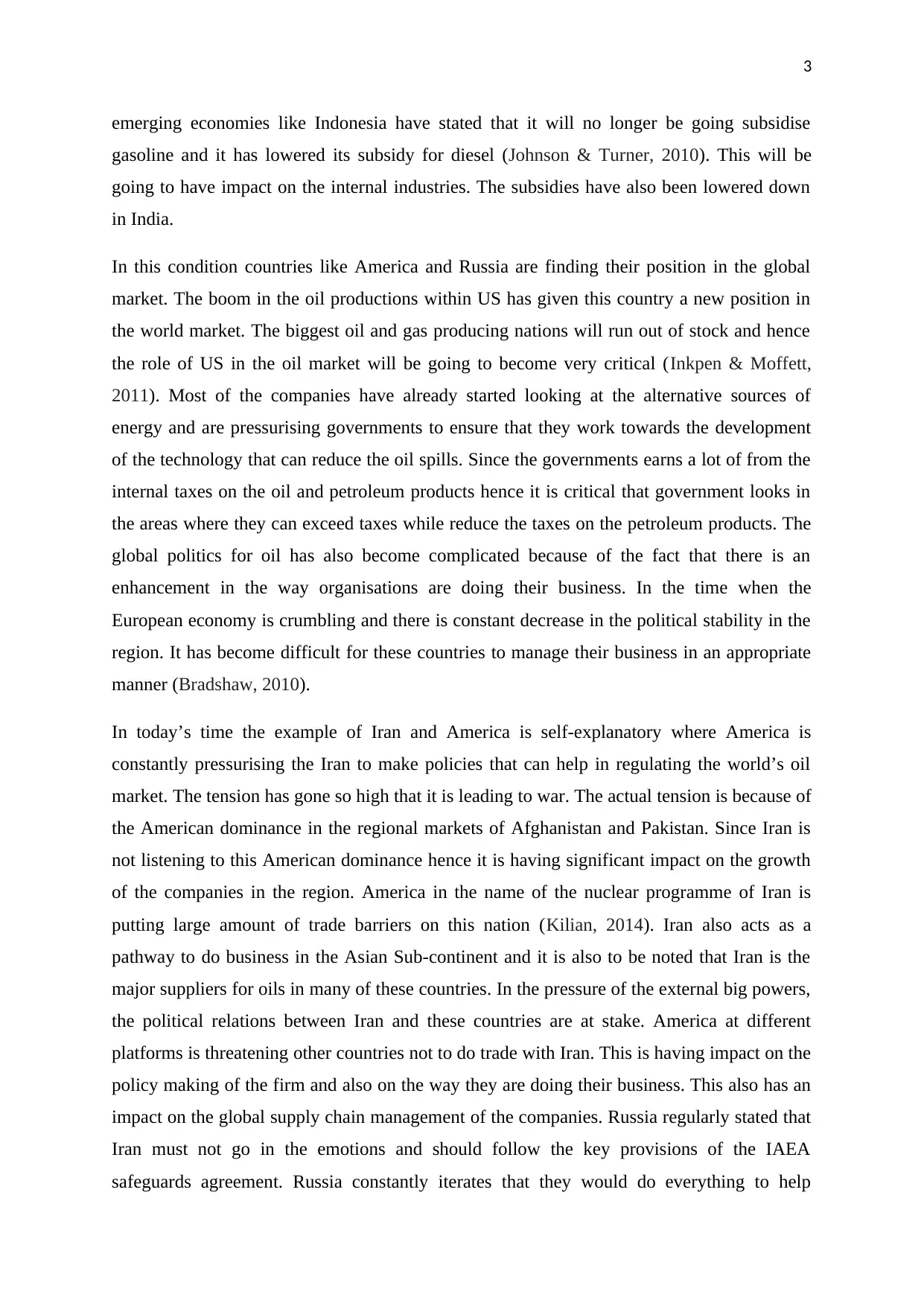
3
emerging economies like Indonesia have stated that it will no longer be going subsidise
gasoline and it has lowered its subsidy for diesel (Johnson & Turner, 2010). This will be
going to have impact on the internal industries. The subsidies have also been lowered down
in India.
In this condition countries like America and Russia are finding their position in the global
market. The boom in the oil productions within US has given this country a new position in
the world market. The biggest oil and gas producing nations will run out of stock and hence
the role of US in the oil market will be going to become very critical (Inkpen & Moffett,
2011). Most of the companies have already started looking at the alternative sources of
energy and are pressurising governments to ensure that they work towards the development
of the technology that can reduce the oil spills. Since the governments earns a lot of from the
internal taxes on the oil and petroleum products hence it is critical that government looks in
the areas where they can exceed taxes while reduce the taxes on the petroleum products. The
global politics for oil has also become complicated because of the fact that there is an
enhancement in the way organisations are doing their business. In the time when the
European economy is crumbling and there is constant decrease in the political stability in the
region. It has become difficult for these countries to manage their business in an appropriate
manner (Bradshaw, 2010).
In today’s time the example of Iran and America is self-explanatory where America is
constantly pressurising the Iran to make policies that can help in regulating the world’s oil
market. The tension has gone so high that it is leading to war. The actual tension is because of
the American dominance in the regional markets of Afghanistan and Pakistan. Since Iran is
not listening to this American dominance hence it is having significant impact on the growth
of the companies in the region. America in the name of the nuclear programme of Iran is
putting large amount of trade barriers on this nation (Kilian, 2014). Iran also acts as a
pathway to do business in the Asian Sub-continent and it is also to be noted that Iran is the
major suppliers for oils in many of these countries. In the pressure of the external big powers,
the political relations between Iran and these countries are at stake. America at different
platforms is threatening other countries not to do trade with Iran. This is having impact on the
policy making of the firm and also on the way they are doing their business. This also has an
impact on the global supply chain management of the companies. Russia regularly stated that
Iran must not go in the emotions and should follow the key provisions of the IAEA
safeguards agreement. Russia constantly iterates that they would do everything to help
emerging economies like Indonesia have stated that it will no longer be going subsidise
gasoline and it has lowered its subsidy for diesel (Johnson & Turner, 2010). This will be
going to have impact on the internal industries. The subsidies have also been lowered down
in India.
In this condition countries like America and Russia are finding their position in the global
market. The boom in the oil productions within US has given this country a new position in
the world market. The biggest oil and gas producing nations will run out of stock and hence
the role of US in the oil market will be going to become very critical (Inkpen & Moffett,
2011). Most of the companies have already started looking at the alternative sources of
energy and are pressurising governments to ensure that they work towards the development
of the technology that can reduce the oil spills. Since the governments earns a lot of from the
internal taxes on the oil and petroleum products hence it is critical that government looks in
the areas where they can exceed taxes while reduce the taxes on the petroleum products. The
global politics for oil has also become complicated because of the fact that there is an
enhancement in the way organisations are doing their business. In the time when the
European economy is crumbling and there is constant decrease in the political stability in the
region. It has become difficult for these countries to manage their business in an appropriate
manner (Bradshaw, 2010).
In today’s time the example of Iran and America is self-explanatory where America is
constantly pressurising the Iran to make policies that can help in regulating the world’s oil
market. The tension has gone so high that it is leading to war. The actual tension is because of
the American dominance in the regional markets of Afghanistan and Pakistan. Since Iran is
not listening to this American dominance hence it is having significant impact on the growth
of the companies in the region. America in the name of the nuclear programme of Iran is
putting large amount of trade barriers on this nation (Kilian, 2014). Iran also acts as a
pathway to do business in the Asian Sub-continent and it is also to be noted that Iran is the
major suppliers for oils in many of these countries. In the pressure of the external big powers,
the political relations between Iran and these countries are at stake. America at different
platforms is threatening other countries not to do trade with Iran. This is having impact on the
policy making of the firm and also on the way they are doing their business. This also has an
impact on the global supply chain management of the companies. Russia regularly stated that
Iran must not go in the emotions and should follow the key provisions of the IAEA
safeguards agreement. Russia constantly iterates that they would do everything to help
Paraphrase This Document
Need a fresh take? Get an instant paraphrase of this document with our AI Paraphraser
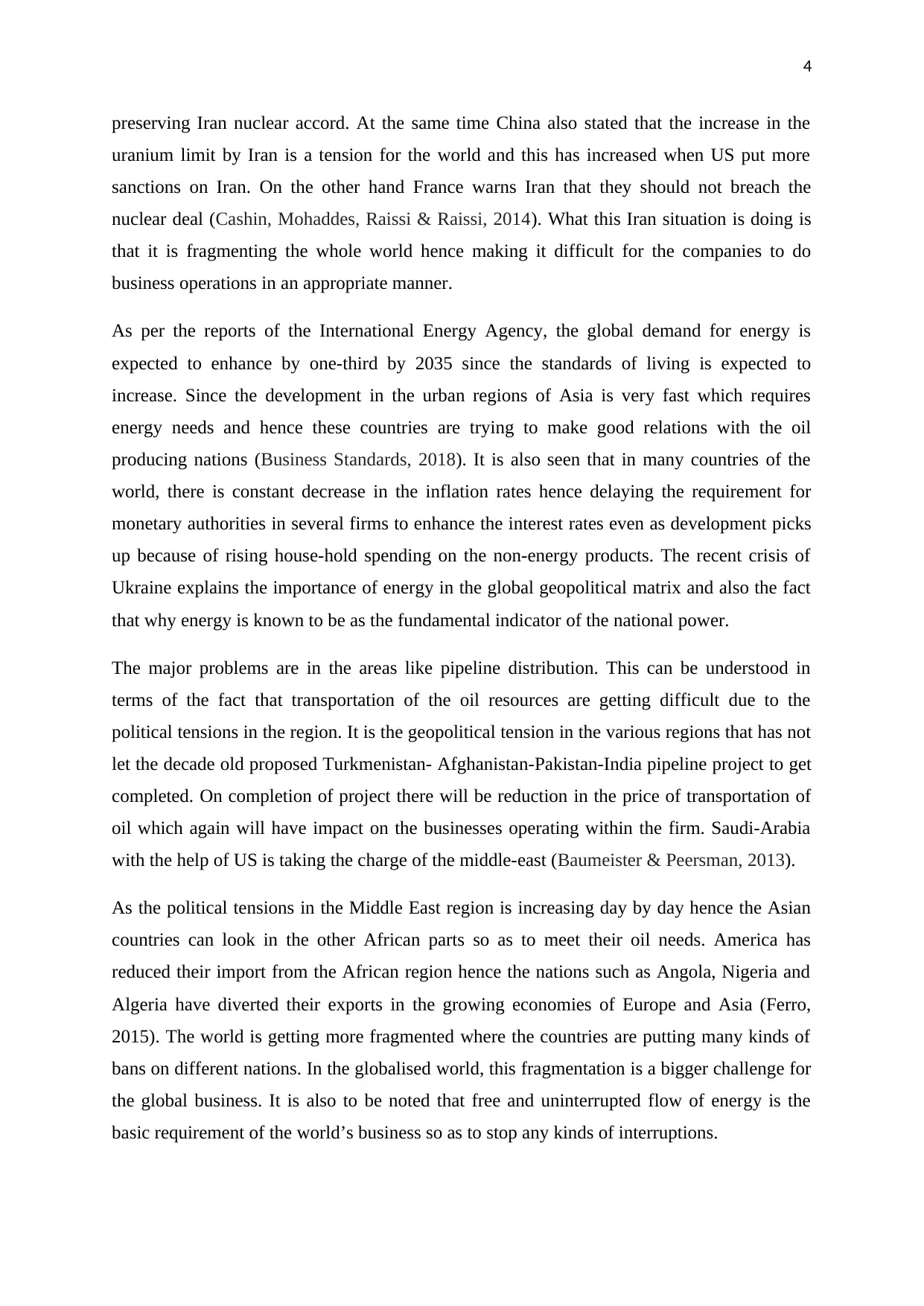
4
preserving Iran nuclear accord. At the same time China also stated that the increase in the
uranium limit by Iran is a tension for the world and this has increased when US put more
sanctions on Iran. On the other hand France warns Iran that they should not breach the
nuclear deal (Cashin, Mohaddes, Raissi & Raissi, 2014). What this Iran situation is doing is
that it is fragmenting the whole world hence making it difficult for the companies to do
business operations in an appropriate manner.
As per the reports of the International Energy Agency, the global demand for energy is
expected to enhance by one-third by 2035 since the standards of living is expected to
increase. Since the development in the urban regions of Asia is very fast which requires
energy needs and hence these countries are trying to make good relations with the oil
producing nations (Business Standards, 2018). It is also seen that in many countries of the
world, there is constant decrease in the inflation rates hence delaying the requirement for
monetary authorities in several firms to enhance the interest rates even as development picks
up because of rising house-hold spending on the non-energy products. The recent crisis of
Ukraine explains the importance of energy in the global geopolitical matrix and also the fact
that why energy is known to be as the fundamental indicator of the national power.
The major problems are in the areas like pipeline distribution. This can be understood in
terms of the fact that transportation of the oil resources are getting difficult due to the
political tensions in the region. It is the geopolitical tension in the various regions that has not
let the decade old proposed Turkmenistan- Afghanistan-Pakistan-India pipeline project to get
completed. On completion of project there will be reduction in the price of transportation of
oil which again will have impact on the businesses operating within the firm. Saudi-Arabia
with the help of US is taking the charge of the middle-east (Baumeister & Peersman, 2013).
As the political tensions in the Middle East region is increasing day by day hence the Asian
countries can look in the other African parts so as to meet their oil needs. America has
reduced their import from the African region hence the nations such as Angola, Nigeria and
Algeria have diverted their exports in the growing economies of Europe and Asia (Ferro,
2015). The world is getting more fragmented where the countries are putting many kinds of
bans on different nations. In the globalised world, this fragmentation is a bigger challenge for
the global business. It is also to be noted that free and uninterrupted flow of energy is the
basic requirement of the world’s business so as to stop any kinds of interruptions.
preserving Iran nuclear accord. At the same time China also stated that the increase in the
uranium limit by Iran is a tension for the world and this has increased when US put more
sanctions on Iran. On the other hand France warns Iran that they should not breach the
nuclear deal (Cashin, Mohaddes, Raissi & Raissi, 2014). What this Iran situation is doing is
that it is fragmenting the whole world hence making it difficult for the companies to do
business operations in an appropriate manner.
As per the reports of the International Energy Agency, the global demand for energy is
expected to enhance by one-third by 2035 since the standards of living is expected to
increase. Since the development in the urban regions of Asia is very fast which requires
energy needs and hence these countries are trying to make good relations with the oil
producing nations (Business Standards, 2018). It is also seen that in many countries of the
world, there is constant decrease in the inflation rates hence delaying the requirement for
monetary authorities in several firms to enhance the interest rates even as development picks
up because of rising house-hold spending on the non-energy products. The recent crisis of
Ukraine explains the importance of energy in the global geopolitical matrix and also the fact
that why energy is known to be as the fundamental indicator of the national power.
The major problems are in the areas like pipeline distribution. This can be understood in
terms of the fact that transportation of the oil resources are getting difficult due to the
political tensions in the region. It is the geopolitical tension in the various regions that has not
let the decade old proposed Turkmenistan- Afghanistan-Pakistan-India pipeline project to get
completed. On completion of project there will be reduction in the price of transportation of
oil which again will have impact on the businesses operating within the firm. Saudi-Arabia
with the help of US is taking the charge of the middle-east (Baumeister & Peersman, 2013).
As the political tensions in the Middle East region is increasing day by day hence the Asian
countries can look in the other African parts so as to meet their oil needs. America has
reduced their import from the African region hence the nations such as Angola, Nigeria and
Algeria have diverted their exports in the growing economies of Europe and Asia (Ferro,
2015). The world is getting more fragmented where the countries are putting many kinds of
bans on different nations. In the globalised world, this fragmentation is a bigger challenge for
the global business. It is also to be noted that free and uninterrupted flow of energy is the
basic requirement of the world’s business so as to stop any kinds of interruptions.
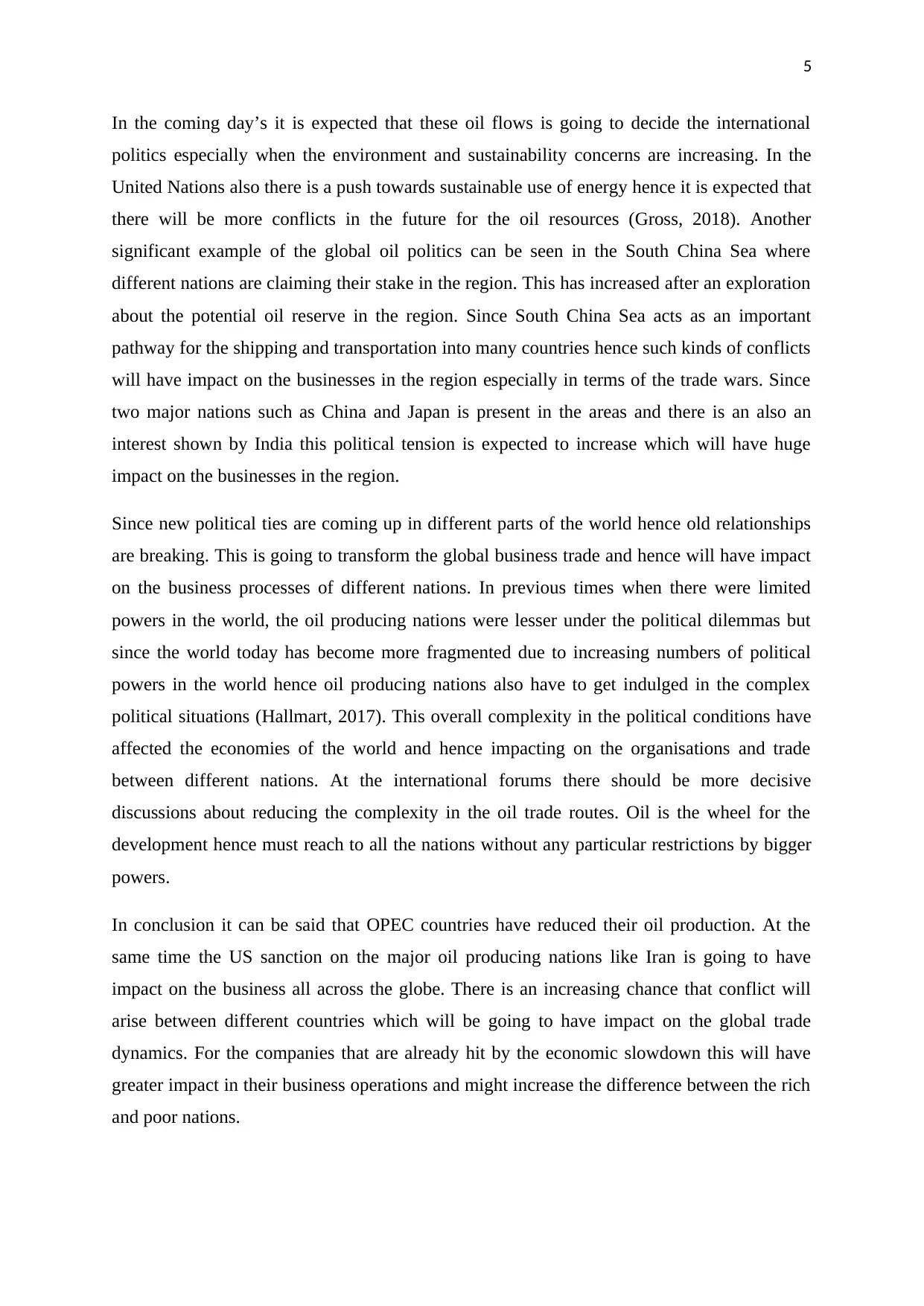
5
In the coming day’s it is expected that these oil flows is going to decide the international
politics especially when the environment and sustainability concerns are increasing. In the
United Nations also there is a push towards sustainable use of energy hence it is expected that
there will be more conflicts in the future for the oil resources (Gross, 2018). Another
significant example of the global oil politics can be seen in the South China Sea where
different nations are claiming their stake in the region. This has increased after an exploration
about the potential oil reserve in the region. Since South China Sea acts as an important
pathway for the shipping and transportation into many countries hence such kinds of conflicts
will have impact on the businesses in the region especially in terms of the trade wars. Since
two major nations such as China and Japan is present in the areas and there is an also an
interest shown by India this political tension is expected to increase which will have huge
impact on the businesses in the region.
Since new political ties are coming up in different parts of the world hence old relationships
are breaking. This is going to transform the global business trade and hence will have impact
on the business processes of different nations. In previous times when there were limited
powers in the world, the oil producing nations were lesser under the political dilemmas but
since the world today has become more fragmented due to increasing numbers of political
powers in the world hence oil producing nations also have to get indulged in the complex
political situations (Hallmart, 2017). This overall complexity in the political conditions have
affected the economies of the world and hence impacting on the organisations and trade
between different nations. At the international forums there should be more decisive
discussions about reducing the complexity in the oil trade routes. Oil is the wheel for the
development hence must reach to all the nations without any particular restrictions by bigger
powers.
In conclusion it can be said that OPEC countries have reduced their oil production. At the
same time the US sanction on the major oil producing nations like Iran is going to have
impact on the business all across the globe. There is an increasing chance that conflict will
arise between different countries which will be going to have impact on the global trade
dynamics. For the companies that are already hit by the economic slowdown this will have
greater impact in their business operations and might increase the difference between the rich
and poor nations.
In the coming day’s it is expected that these oil flows is going to decide the international
politics especially when the environment and sustainability concerns are increasing. In the
United Nations also there is a push towards sustainable use of energy hence it is expected that
there will be more conflicts in the future for the oil resources (Gross, 2018). Another
significant example of the global oil politics can be seen in the South China Sea where
different nations are claiming their stake in the region. This has increased after an exploration
about the potential oil reserve in the region. Since South China Sea acts as an important
pathway for the shipping and transportation into many countries hence such kinds of conflicts
will have impact on the businesses in the region especially in terms of the trade wars. Since
two major nations such as China and Japan is present in the areas and there is an also an
interest shown by India this political tension is expected to increase which will have huge
impact on the businesses in the region.
Since new political ties are coming up in different parts of the world hence old relationships
are breaking. This is going to transform the global business trade and hence will have impact
on the business processes of different nations. In previous times when there were limited
powers in the world, the oil producing nations were lesser under the political dilemmas but
since the world today has become more fragmented due to increasing numbers of political
powers in the world hence oil producing nations also have to get indulged in the complex
political situations (Hallmart, 2017). This overall complexity in the political conditions have
affected the economies of the world and hence impacting on the organisations and trade
between different nations. At the international forums there should be more decisive
discussions about reducing the complexity in the oil trade routes. Oil is the wheel for the
development hence must reach to all the nations without any particular restrictions by bigger
powers.
In conclusion it can be said that OPEC countries have reduced their oil production. At the
same time the US sanction on the major oil producing nations like Iran is going to have
impact on the business all across the globe. There is an increasing chance that conflict will
arise between different countries which will be going to have impact on the global trade
dynamics. For the companies that are already hit by the economic slowdown this will have
greater impact in their business operations and might increase the difference between the rich
and poor nations.
⊘ This is a preview!⊘
Do you want full access?
Subscribe today to unlock all pages.

Trusted by 1+ million students worldwide
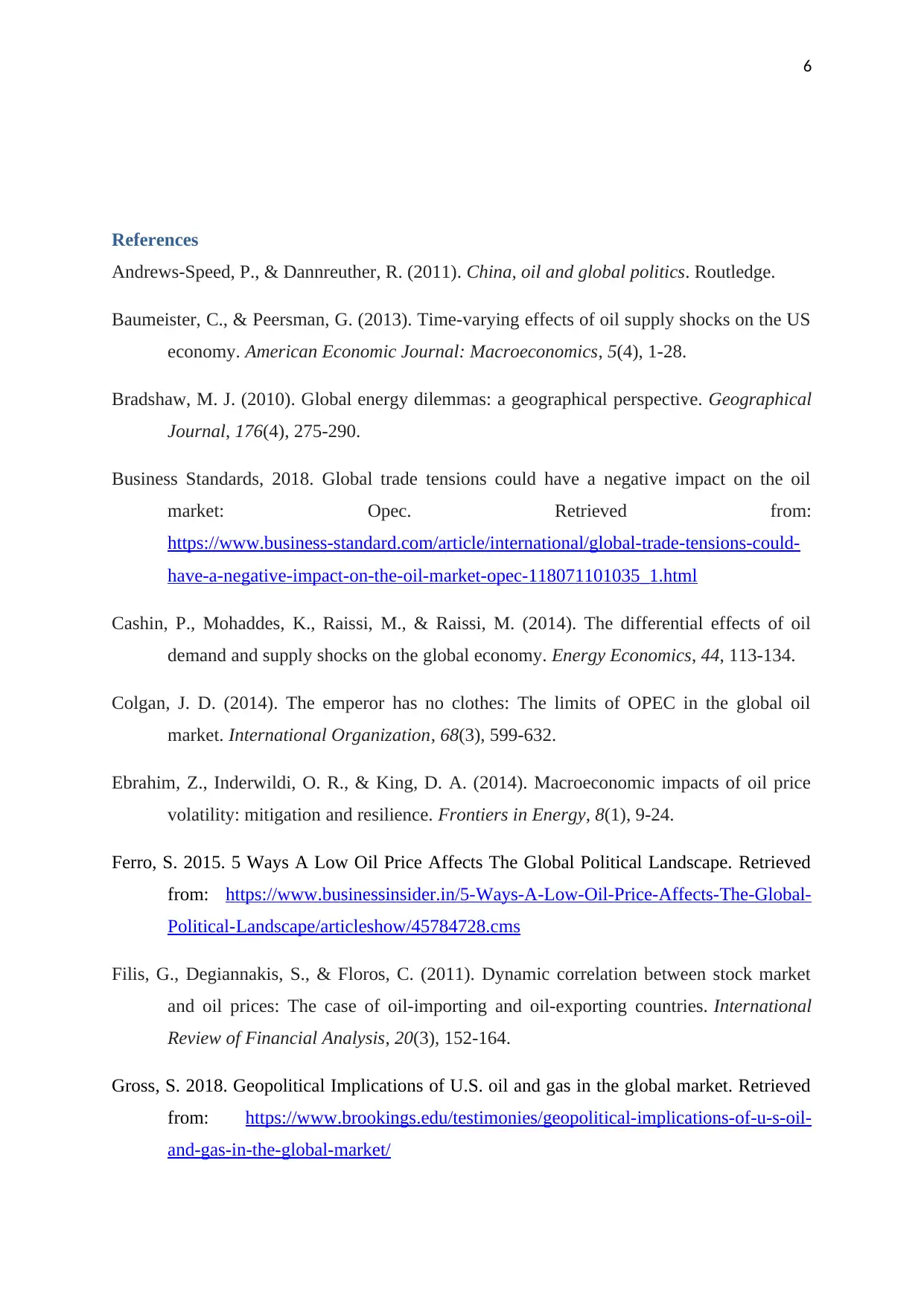
6
References
Andrews-Speed, P., & Dannreuther, R. (2011). China, oil and global politics. Routledge.
Baumeister, C., & Peersman, G. (2013). Time-varying effects of oil supply shocks on the US
economy. American Economic Journal: Macroeconomics, 5(4), 1-28.
Bradshaw, M. J. (2010). Global energy dilemmas: a geographical perspective. Geographical
Journal, 176(4), 275-290.
Business Standards, 2018. Global trade tensions could have a negative impact on the oil
market: Opec. Retrieved from:
https://www.business-standard.com/article/international/global-trade-tensions-could-
have-a-negative-impact-on-the-oil-market-opec-118071101035_1.html
Cashin, P., Mohaddes, K., Raissi, M., & Raissi, M. (2014). The differential effects of oil
demand and supply shocks on the global economy. Energy Economics, 44, 113-134.
Colgan, J. D. (2014). The emperor has no clothes: The limits of OPEC in the global oil
market. International Organization, 68(3), 599-632.
Ebrahim, Z., Inderwildi, O. R., & King, D. A. (2014). Macroeconomic impacts of oil price
volatility: mitigation and resilience. Frontiers in Energy, 8(1), 9-24.
Ferro, S. 2015. 5 Ways A Low Oil Price Affects The Global Political Landscape. Retrieved
from: https://www.businessinsider.in/5-Ways-A-Low-Oil-Price-Affects-The-Global-
Political-Landscape/articleshow/45784728.cms
Filis, G., Degiannakis, S., & Floros, C. (2011). Dynamic correlation between stock market
and oil prices: The case of oil-importing and oil-exporting countries. International
Review of Financial Analysis, 20(3), 152-164.
Gross, S. 2018. Geopolitical Implications of U.S. oil and gas in the global market. Retrieved
from: https://www.brookings.edu/testimonies/geopolitical-implications-of-u-s-oil-
and-gas-in-the-global-market/
References
Andrews-Speed, P., & Dannreuther, R. (2011). China, oil and global politics. Routledge.
Baumeister, C., & Peersman, G. (2013). Time-varying effects of oil supply shocks on the US
economy. American Economic Journal: Macroeconomics, 5(4), 1-28.
Bradshaw, M. J. (2010). Global energy dilemmas: a geographical perspective. Geographical
Journal, 176(4), 275-290.
Business Standards, 2018. Global trade tensions could have a negative impact on the oil
market: Opec. Retrieved from:
https://www.business-standard.com/article/international/global-trade-tensions-could-
have-a-negative-impact-on-the-oil-market-opec-118071101035_1.html
Cashin, P., Mohaddes, K., Raissi, M., & Raissi, M. (2014). The differential effects of oil
demand and supply shocks on the global economy. Energy Economics, 44, 113-134.
Colgan, J. D. (2014). The emperor has no clothes: The limits of OPEC in the global oil
market. International Organization, 68(3), 599-632.
Ebrahim, Z., Inderwildi, O. R., & King, D. A. (2014). Macroeconomic impacts of oil price
volatility: mitigation and resilience. Frontiers in Energy, 8(1), 9-24.
Ferro, S. 2015. 5 Ways A Low Oil Price Affects The Global Political Landscape. Retrieved
from: https://www.businessinsider.in/5-Ways-A-Low-Oil-Price-Affects-The-Global-
Political-Landscape/articleshow/45784728.cms
Filis, G., Degiannakis, S., & Floros, C. (2011). Dynamic correlation between stock market
and oil prices: The case of oil-importing and oil-exporting countries. International
Review of Financial Analysis, 20(3), 152-164.
Gross, S. 2018. Geopolitical Implications of U.S. oil and gas in the global market. Retrieved
from: https://www.brookings.edu/testimonies/geopolitical-implications-of-u-s-oil-
and-gas-in-the-global-market/
Paraphrase This Document
Need a fresh take? Get an instant paraphrase of this document with our AI Paraphraser
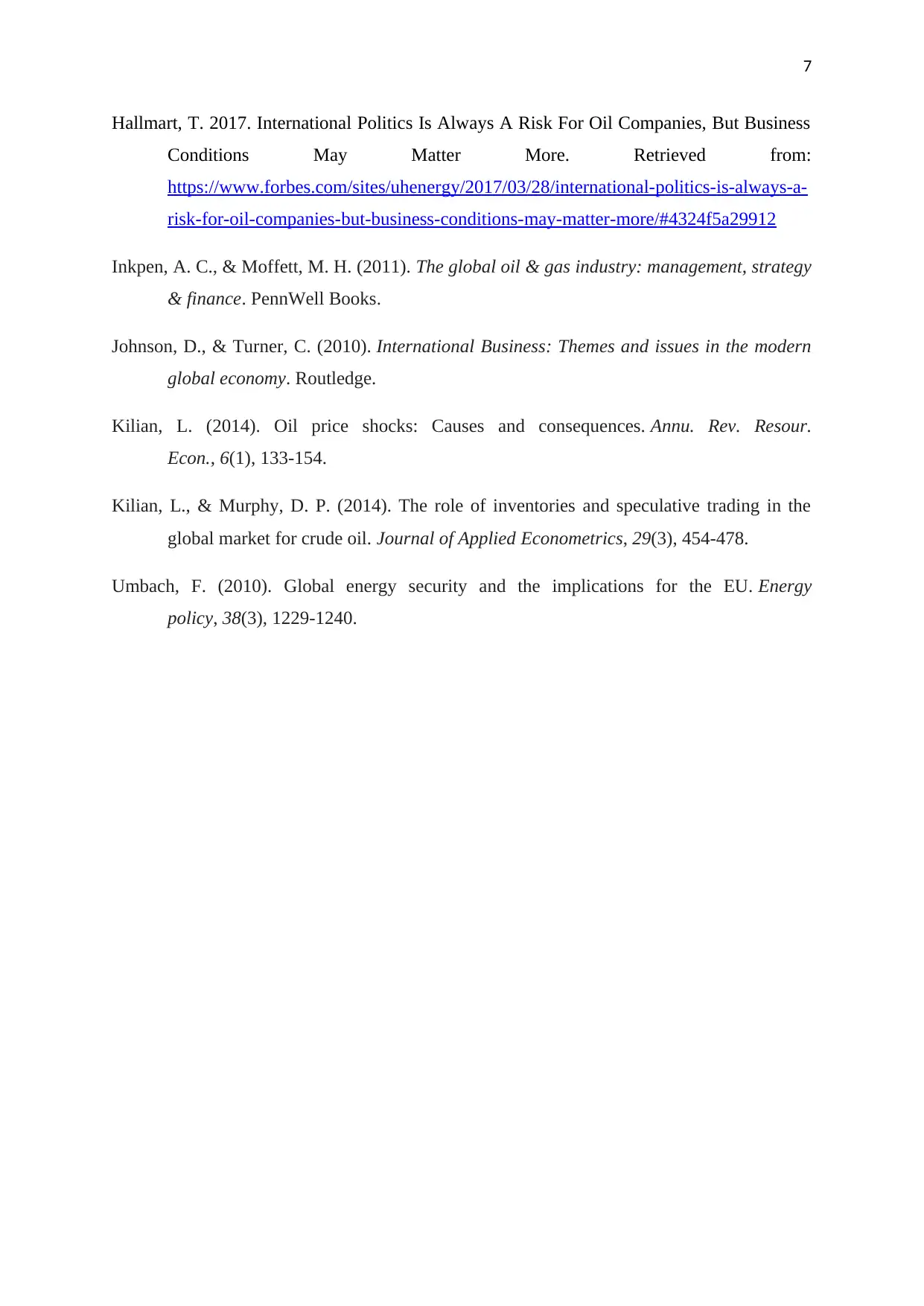
7
Hallmart, T. 2017. International Politics Is Always A Risk For Oil Companies, But Business
Conditions May Matter More. Retrieved from:
https://www.forbes.com/sites/uhenergy/2017/03/28/international-politics-is-always-a-
risk-for-oil-companies-but-business-conditions-may-matter-more/#4324f5a29912
Inkpen, A. C., & Moffett, M. H. (2011). The global oil & gas industry: management, strategy
& finance. PennWell Books.
Johnson, D., & Turner, C. (2010). International Business: Themes and issues in the modern
global economy. Routledge.
Kilian, L. (2014). Oil price shocks: Causes and consequences. Annu. Rev. Resour.
Econ., 6(1), 133-154.
Kilian, L., & Murphy, D. P. (2014). The role of inventories and speculative trading in the
global market for crude oil. Journal of Applied Econometrics, 29(3), 454-478.
Umbach, F. (2010). Global energy security and the implications for the EU. Energy
policy, 38(3), 1229-1240.
Hallmart, T. 2017. International Politics Is Always A Risk For Oil Companies, But Business
Conditions May Matter More. Retrieved from:
https://www.forbes.com/sites/uhenergy/2017/03/28/international-politics-is-always-a-
risk-for-oil-companies-but-business-conditions-may-matter-more/#4324f5a29912
Inkpen, A. C., & Moffett, M. H. (2011). The global oil & gas industry: management, strategy
& finance. PennWell Books.
Johnson, D., & Turner, C. (2010). International Business: Themes and issues in the modern
global economy. Routledge.
Kilian, L. (2014). Oil price shocks: Causes and consequences. Annu. Rev. Resour.
Econ., 6(1), 133-154.
Kilian, L., & Murphy, D. P. (2014). The role of inventories and speculative trading in the
global market for crude oil. Journal of Applied Econometrics, 29(3), 454-478.
Umbach, F. (2010). Global energy security and the implications for the EU. Energy
policy, 38(3), 1229-1240.
1 out of 8
Related Documents
Your All-in-One AI-Powered Toolkit for Academic Success.
+13062052269
info@desklib.com
Available 24*7 on WhatsApp / Email
![[object Object]](/_next/static/media/star-bottom.7253800d.svg)
Unlock your academic potential
Copyright © 2020–2026 A2Z Services. All Rights Reserved. Developed and managed by ZUCOL.





